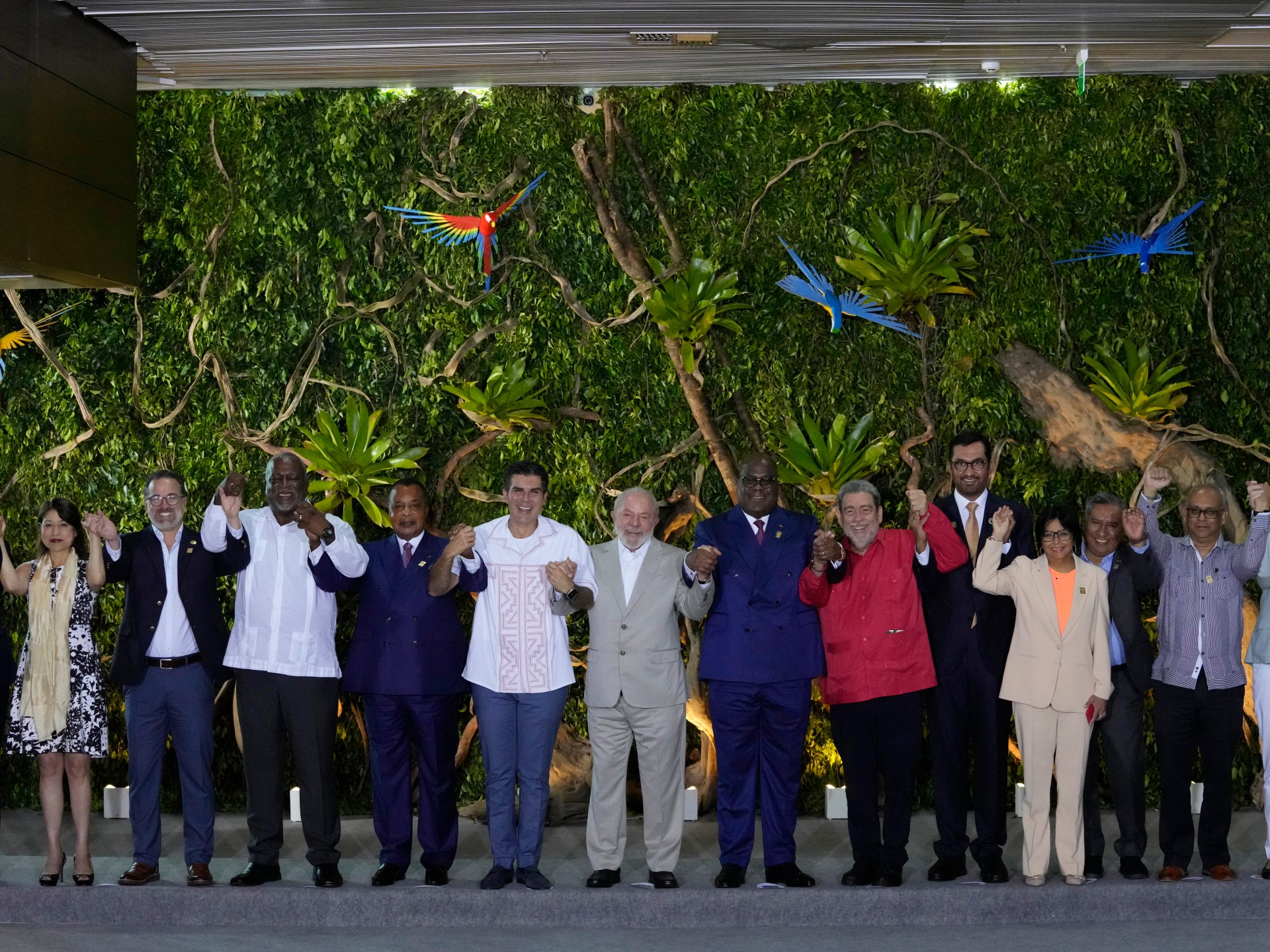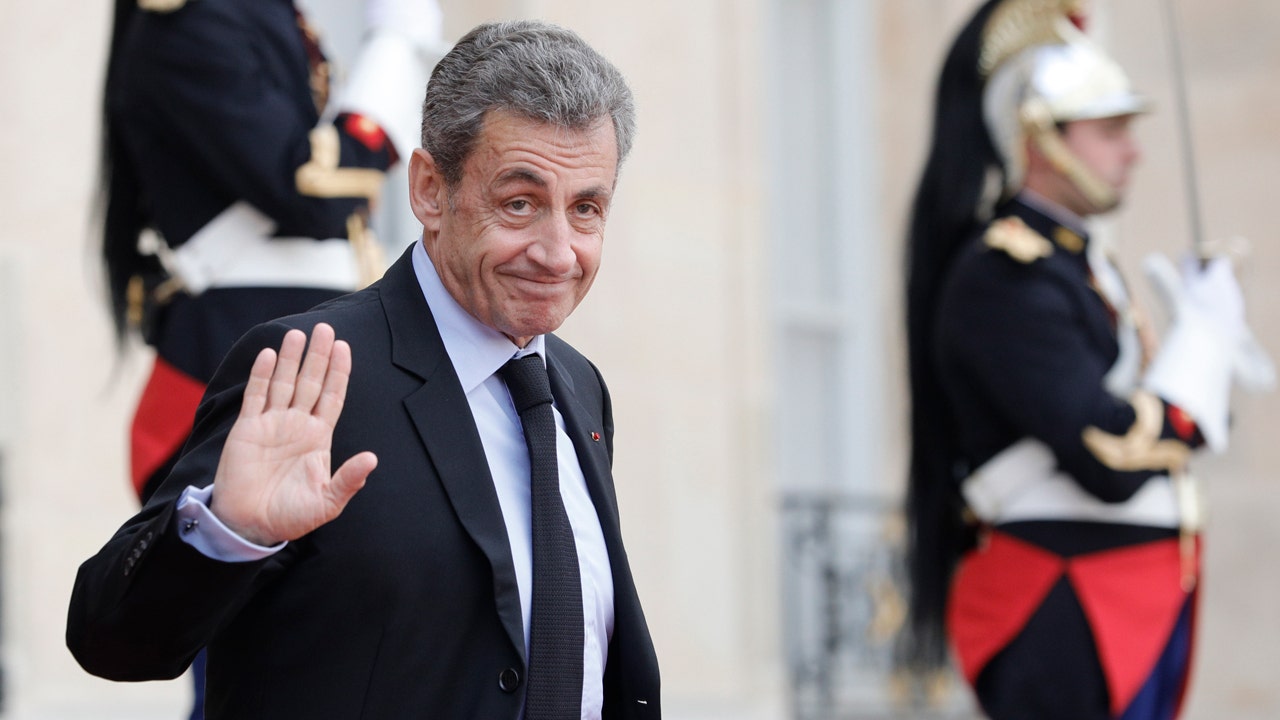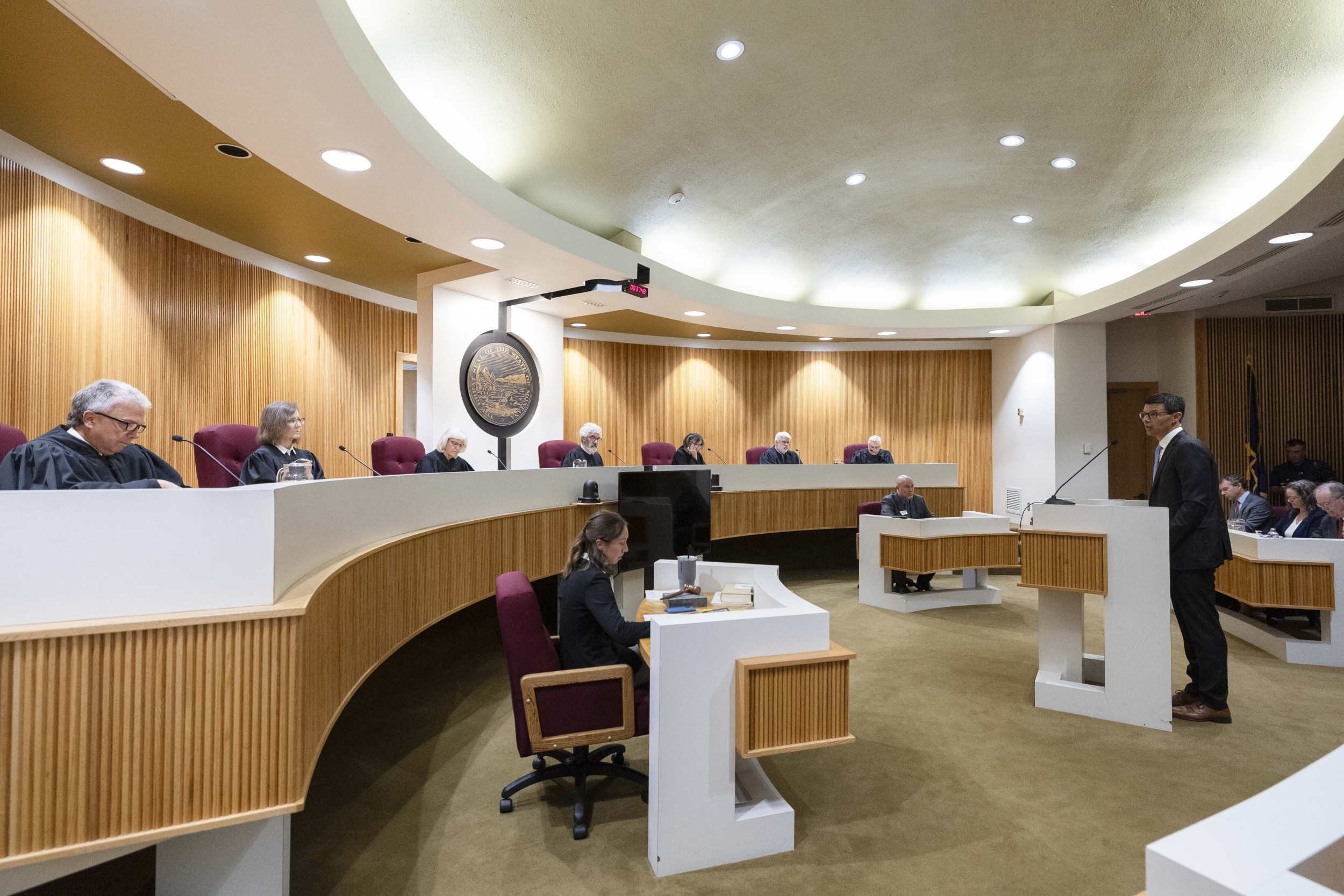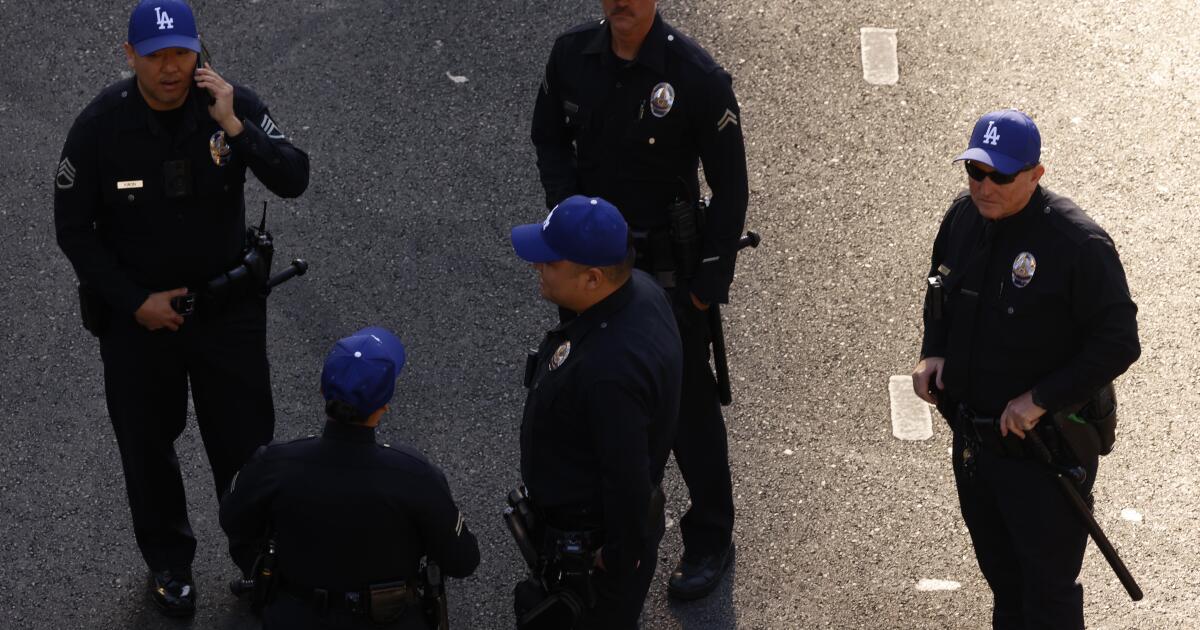World
Amazon summit calls on developed nations to fulfill climate funding deals

Twelve countries have called on wealthy nations to meet their climate funding obligations, on the final day of the Amazon Summit in Belem, Brazil.
Wednesday’s pact, called “United for Our Forests”, brought together leaders from the Amazon, the Congo Basin and southeast Asia, three regions with some of the most extensive rainforests in the world.
The joint statement called for the development of a financing mechanism so the international community could pay for the critical services provided by forests.
“Our countries must wield more influence over the management of resources allocated to the conservation and sustainable use of biodiversity,” the pact said of developing nations.
It also urged developed nations to meet an existing commitment to provide $200bn a year for biodiversity preservation and expressed concern that a previous promise to deliver $100bn in climate financing annually had not been fulfilled.
Speaking on Wednesday, Brazilian President Luiz Inacio Lula da Silva said the Amazon Summit gave an opportunity for rainforest nations to unify in advance of October’s United Nations Climate Change Conference summit, or COP28, in Abu Dhabi.
“We are going to COP28 with the aim of telling the rich world that, if they want to effectively preserve the forest that exists, they need to pay money not only to take care of the canopy but to take care of the people who live under it,” he said.
Wednesday’s statement also criticised what it described as trade restrictions disguised as environmental measures, in an apparent reference to the European Union’s passage of a law prohibiting firms from importing goods linked to deforestation.
The communiqué was signed by leaders from Bolivia, Brazil, Colombia, the Democratic Republic of Congo, Ecuador, Guyana, Indonesia, Peru, the Republic of Congo, Suriname, Venezuela and Saint Vincent and the Grenadines.
The rainforests in those countries are critical ecosystems in the fight against climate change, capable of absorbing large amounts of carbon dioxide, as well as housing diverse species.
New pact follows Belem Declaration
A day earlier, the eight countries of the Amazon Cooperation Treaty Organization (ACTO) —Bolivia, Brazil, Colombia, Ecuador, Guyana, Peru, Suriname and Venezuela — adopted a “new and ambitious shared agenda” to save the sprawling South American rainforest with the announcement of the Belem Declaration.
The agreement, however, fell short of committing to zero deforestation by 2030. Instead, it created an alliance between the Amazon countries to pursue individual deforestation goals, through the protection of Indigenous rights and cooperation on water management, health and sustainable development.
The declaration further established a science body to meet annually and produce authoritative reports on science related to the Amazon rainforest, akin to the United Nations International Panel on Climate Change (IPCC).
Reporting from Belem, Al Jazeera’s Lucia Newman said officials will be working on a more detailed agreement in the coming months.
“It’s going to be interesting to see what happens when the foreign ministers of all the countries that are here meet in two months’ time to hammer out the details of this Belem declaration,” she said.
Still, the summit failed to satisfy environmentalist and Indigenous groups’ most sweeping demands, including that all member countries adopt Brazil’s pledge to end illegal deforestation by 2030.
The declaration also did not fix a deadline for ending illegal gold mining, although leaders agreed to cooperate on the issue.
Tensions had emerged before the summit, with some leaders rebuffing the position of Colombia’s left-wing President Gustavo Petro, who has pledged to halt new oil exploration in his country.
Brazil’s President Lula, meanwhile, has largely refrained from taking a definitive stance on the issue. Upon entering office, Lula pledged to reassert Brazil’s role as an environmental leader, after his predecessor, right-wing President Jair Bolsonaro, scaled back measures to protect the Amazon.
Nearly 60 percent of the Amazon rainforest is in Brazil. Some scientists have warned that, when 20 to 25 percent of the forest is destroyed, rainfall will dramatically decline, transforming more than half of the region into tropical savannah and causing immense biodiversity loss.

World
Arson at karaoke bar in Vietnam’s Hanoi kills 11, police say

Vietnam’s Ministry of Public Security says suspected perpetrator confessed to starting blaze after dispute with staff.
A suspected arson attack at a cafe and karaoke bar in Vietnam’s Hanoi has killed 11 people and injured two others, police have said.
Vietnam’s Ministry of Public Security said on Thursday that it had arrested a man who confessed to starting the blaze on the ground floor of the building following a dispute with staff.
Rescue workers who rushed to the scene brought seven people out of the building alive, two of whom were rushed to hospital, police said.
Footage that circulated on social media showed a multistorey building engulfed in flames as firefighters worked at the scene while surrounded by a crowd of onlookers.
“At that time, we saw many people screaming for help but could not approach because the fire spread very quickly, and even with a ladder, we could not climb up,” the Lao Dong newspaper quoted a witness as saying.
The Tien Phong newspaper quoted a witness as saying there was a strong smell of petrol at the scene.
“Everyone shouted for those inside to run outside, but no one called for help,” the witness said.
CCTV footage published by the VnExpress news site appeared to show a man carrying a bucket towards the cafe seconds before the blaze began shortly after 11pm (16:00 GMT) on Wednesday.
Fires are a common hazard in Vietnam’s tightly packed urban centres.
Between 2017 and 2022, 433 people were killed in some 17,000 house fires in the country, most of them in urban areas, according to the Ministry of Public Security.
In September last year, 56 people, including four children, were killed and dozens injured in a fire at an apartment block in Hanoi.
This October, a court in southern Binh Duong province jailed six people, including four police officers, over safety lapses related to a fire at a karaoke complex that killed 32 people in 2022.
World
The Year in Pictures 2024: Far From Ordinary

When shots were fired at a campaign rally for former President Donald J. Trump on a July evening in Butler, Pa., the veteran New York Times photographer Doug Mills was just a few feet from him. As the Secret Service rushed toward Mr. Trump, Mr. Mills’s heart pounded when he realized what was happening.
Then instinct took over. Mr. Mills kept taking pictures, at an extremely fast shutter speed of one eight-thousandth of a second, capturing an image that illustrates the magnitude of that moment: Mr. Trump, his face streaked with blood, his fist raised in defiance.
This year was made up of such extraordinary moments. And Times photographers captured them in extraordinary images. The Year in Pictures brings you the most powerful, evocative and history-making of those images — and allows you to see the biggest stories of 2024 through our photographers’ eyes.
The presidential campaign — full of twists and turns — provided some of our most memorable photos. Kenny Holston captured a shaky President Biden struggling to find his footing in what turned out to be his only debate of the 2024 election. Erin Schaff conveyed the exhilaration surrounding Vice President Kamala Harris in the short sprint of her campaign. And Todd Heisler brought home the excitement of an 8-year-old girl in pigtails, Ms. Harris’s great-niece, who watched with pride as Ms. Harris accepted her party’s nomination for president.
Yet even as the American political campaign intensified, wars ground on overseas, creating new dangers and obstacles for our photojournalists determined to document the fighting. The war between Hamas and Israel escalated into a regional conflict, and our photographers depicted the Israeli airstrikes on Lebanon, the families forced to flee their homes and the neighborhoods reduced to rubble.
When Israeli forces recovered the bodies of six hostages in Gaza, our photographers revealed the pain of the captives’ families as they cried out at their loved ones’ funerals after 11 months of anguished waiting. And last month, Samar Abu Elouf, a Palestinian photographer for The Times, delivered some of the most indelible images of the year: a series of portraits of Gazans horribly injured in the war, including children who had lost arms, legs or eyes.
Children were also central to the work of Lynsey Addario, a veteran photographer who has been chronicling the war in Ukraine since Russia first invaded in 2022. Ms. Addario’s images tell the stories of young Ukrainians with cancer whose treatment was disrupted by the war, often with devastating results. One, a 5-year-old girl whose chemotherapy was upended by the Russian invasion, ultimately lost her life.
Our photographers embrace their calling of bearing witness to history, showing readers the atrocities and the suffering that might otherwise be overlooked. But they also see their mission more broadly, and aim to depict the richness and color of life by regularly bringing us pictures that delight and surprise.
Take the photo by Hiroko Masuike from the ticker-tape parade in October for the New York Liberty women’s basketball team. The young fans pictured radiate a kind of awe-struck joy, screaming to the players by name. Or the photographs that show the sense of wonder on the faces of people at Niagara Falls as they bask in the magic of a solar eclipse in April.
We hope you can spend some time with these pictures, and take in our photographers’ reflections on them. This collection of images is a way to remember the year, but it is also, we hope, an opportunity to better understand their craft and their devotion to producing the world’s best photojournalism.
Curation
Tanner Curtis, Jeffrey Henson Scales
Interviews
Dionne Searcey
Editing
Natasha King
Digital Design
Matt Ruby
Print Design
Mary Jane Callister, Felicia Vasquez
Production
Peter Blair, Eric Dyer, Wendy Lu, Nancy Ramsey, Jessica Schnall, Hannah Wulkan
Additional Production
Anna Diamond
New York Times Director of Photography
Meaghan Looram
World
French high court upholds ex-president's corruption conviction

France’s highest court has upheld an appeal court decision which had found former President Nicolas Sarkozy guilty of corruption and influence peddling while he was the country’s head of state.
Sarkozy, 69, faces a year in prison, but is expected to ask to be detained at home with an electronic bracelet — as is the case for any sentence of two years or less.
He was found guilty of corruption and influence peddling by both a Paris court in 2021 and an appeals court in 2023 for trying to bribe a magistrate in exchange for information about a legal case in which he was implicated.
“The convictions and sentences are therefore final,” a Court of Cassation statement on Wednesday said.
FRANCE’S MACRON NAMES CENTRIST ALLY BAYROU AS NEXT PRIME MINISTER
Sarkozy, who was France’s president from 2007 to 2012, retired from public life in 2017 though still plays an influential role in French conservative politics. He was among the guests who attended the reopening of Notre Dame Cathedral earlier this month.
Sarkozy, in a statement posted on X, said “I will assume my responsibilities and face all the consequences.”
He added: “I have no intention of complaining. But I am not prepared to accept the profound injustice done to me.”
Sarkozy said he will seek to bring the case to the European Court of Human Rights, and hopes those proceedings will result in “France being condemned.”
He reiterated his “full innocence.”
“My determination is total in this case as in all others,” he concluded.
FILE – Former French President Nicolas Sarkozy leaves the Elysee Palace after a lunch with heads of states and officials, Monday, Sept. 30, 2019 in Paris. (AP Photo/Kamil Zihnioglu, File)
Sarkozy’s lawyer, Patrice Spinosi, said his client “will comply” with the ruling. This means the former president will have to wear an electronic bracelet, Spinosi said.
It is the first time in France’s modern history that a former president has been convicted and sentenced to a prison term for actions during his term.
Sarkozy’s predecessor, Jacques Chirac, was found guilty in 2011 of misuse of public money during his time as Paris mayor and was given a two-year suspended prison sentence.
Sarkozy has been involved in several other legal cases. He has denied any wrongdoing.
He faces another trial next month in Paris over accusations he took millions of dollars from then-Libyan dictator Moammar Gadhafi to illegally finance his successful 2007 campaign.
The corruption case that led to Wednesday’s ruling focused on phone conversations that took place in February 2014.
At the time, investigative judges had launched an inquiry into the financing of Sarkozy’s 2007 presidential campaign. During the inquiry, they discovered that Sarkozy and his lawyer, Thierry Herzog, were communicating via secret mobile phones registered to the alias “Paul Bismuth.”
Wiretapped conversations on those phones led prosecutors to suspect Sarkozy and Herzog of promising magistrate Gilbert Azibert a job in Monaco in exchange for leaking information about another legal case involving Sarkozy. Azibert never got the post and legal proceedings against Sarkozy have been dropped in the case he was seeking information about.
Prosecutors had concluded, however, that the proposal still constitutes corruption under French law, even if the promise wasn’t fulfilled. Sarkozy vigorously denied any malicious intention in his offer to help Azibert.
Azibert and Herzog have also been found guilty in the case.
-

 Business1 week ago
Business1 week agoOpenAI's controversial Sora is finally launching today. Will it truly disrupt Hollywood?
-

 Politics5 days ago
Politics5 days agoCanadian premier threatens to cut off energy imports to US if Trump imposes tariff on country
-
/cdn.vox-cdn.com/uploads/chorus_asset/file/25782636/247422_ChatGPT_anniversary_CVirginia.jpg)
/cdn.vox-cdn.com/uploads/chorus_asset/file/25782636/247422_ChatGPT_anniversary_CVirginia.jpg) Technology7 days ago
Technology7 days agoInside the launch — and future — of ChatGPT
-
/cdn.vox-cdn.com/uploads/chorus_asset/file/25789444/1258459915.jpg)
/cdn.vox-cdn.com/uploads/chorus_asset/file/25789444/1258459915.jpg) Technology5 days ago
Technology5 days agoOpenAI cofounder Ilya Sutskever says the way AI is built is about to change
-

 Politics5 days ago
Politics5 days agoU.S. Supreme Court will decide if oil industry may sue to block California's zero-emissions goal
-
/cdn.vox-cdn.com/uploads/chorus_asset/file/25546252/STK169_Mark_Zuckerburg_CVIRGINIA_D.jpg)
/cdn.vox-cdn.com/uploads/chorus_asset/file/25546252/STK169_Mark_Zuckerburg_CVIRGINIA_D.jpg) Technology5 days ago
Technology5 days agoMeta asks the US government to block OpenAI’s switch to a for-profit
-

 Politics6 days ago
Politics6 days agoConservative group debuts major ad buy in key senators' states as 'soft appeal' for Hegseth, Gabbard, Patel
-

 Business3 days ago
Business3 days agoFreddie Freeman's World Series walk-off grand slam baseball sells at auction for $1.56 million












































































































